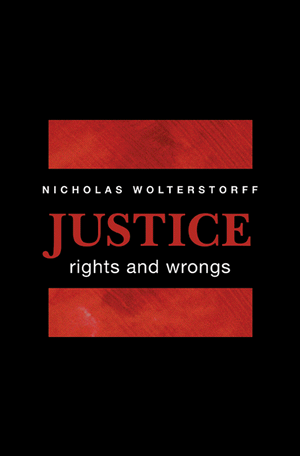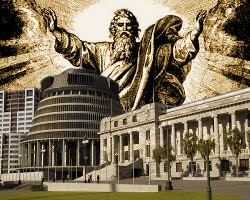I’m not the kind of guy who tends to be fazed when people – even people for whom I hold a good deal of respect as insightful thinkers – do not agree with me. However, I’m also someone who likes to see people that I respect as insightful thinkers expressing the same conclusion as me. I like that kind of affirmation. I guess comparing these two facts just serves as evidence that I’m more likely to interpret evidence as suggesting that I got something right than that I got something wrong – even when I perhaps should!
 Matt from MandM gave me a book for Christmas in 2008, and I’ve only just now started properly reading it through. The book is
Matt from MandM gave me a book for Christmas in 2008, and I’ve only just now started properly reading it through. The book is
To the point – I was very pleased (in the entiely self-serving pat-myself-on-the-back sort of way) to see Wolterstorff saying in print in 2008 what I had written in my doctoral thesis in 2006 (which was later completed in 2007). I quote here from pages 15-16 of Justice:
A few paragraphs back I mentioned John Rawls. Such is the fame of John Rawls’s Theory of Justice that almost everyone who picks up this book will want to know what I have to say about Rawls. Apart from incidental comments, I do not have anything to say about Rawls. The reason for my silence is straightforward. Though Rawls’s theory of justice is an inherent natural rights theory, he does nothing at all to develop an account of such rights. He simply assumes their existence. My interlocutors will be those who do not just appeal to such rights but have something to say about them.
And:
Ronald Dworkin argued that when one looks beneath the surface [of Rawls’s theory], one finds inherent natural rights at the basis of the theory. Fundamental to Rawls’s theory is the principle of equal respect for all members of the social order (or for all members who can engage in the relevant “bargaining”). The question is, what is the basis for this principle of equal respect? Dworkin’s conclusion is that “justice as fairness rests on the assumption of a natural right of all men and women to equality of concern and respect, a right they possess not by virtue of birth or characteristic or merit or excellence but simply as human beings with the capacity to make plans and give justice.” Dworkin’s argument is almost entirely deductive: given other things Rawls says, this has to be his view. But there are passages in Theory of Justice that confirm Dworkin’s interpretation—though it has to be said that Rawls was evidently very reluctant to bring his appeal to inherent natural rights (and duties) to the surface, which is why most readers miss it.
And now from my thesis:
Almost incredibly on the one hand, but understandably on the other, Rawls never really argues that people are equal in any way, shape or form. I say “understandably” because Rawls does not, by all appearances, want to get bogged down in theoretical philosophical considerations, but simply wants to get on with the business of talking about how his theory of justice applies (see for example in the next chapter, page 205, where I note Rawls’ explicit claim that this is so). But it is just obvious that basic egalitarianism is an essential part of Rawls’ theory. As noted in the introduction to the new liberalism, Rawls’ most significant contribution to political science is the original position, that imaginary scenario where we, as relevantly wise and informed people, create a constitution when we are stripped of the particular information about what circumstances we will find ourselves in, such as wealth, geographical location (provided one is in the society in question), and apparently, beliefs about religion, philosophy, and much that we, in the real world, take to be important (but not, incidentally, the fact that we believe political liberalism to be just). This way we will refrain from advocating any social arrangement that favours any person on account of his wealth, geographical location or religion etc. The underlying rationale for this is that nobody should be unfairly advantaged over anyone else since we should all count equally in society. When it comes precisely to the claim that we are equal in Rawls, however, Amy Guttman’s question about Rawls’ device of the original position and the veil of ignorance must be answered by affirming the latter of the following two options: “Does it provide an Archimedean point of justification or does it simply suggest a framework that organizes the firmest intentions of someone who is already a committed egalitarian?” (Amy Guttman, Liberal Equality (Cambridge: Cambridge University Press, 1980), 120.)
Rawls apparently did not think that since equality is necessary for political liberalism, it is itself subject to any of the truth tests or justificatory obligations that other beliefs must meet.
Justice is the first virtue of social institutions, as truth is of thought. A theory however elegant and economical must be rejected or revised if it is untrue; likewise laws and institutions no matter how efficient and well-arranged must be reformed or abolished if they are unjust. Each person possesses an inviolability founded on justice that even the welfare of society as a whole cannot override. For this reason justice denies that the loss of freedom for some is made right by a greater good shared by others. It does not allow that the sacrifices imposed on a few are outweighed by the larger sum of advantages enjoyed by many. Therefore in a just society the liberties of equal citizenship are taken as settled.
Rawls, A Theory of Justice (Oxford: Oxford University Press, 1999, 2nd ed.), 3.
But the claim that we are equal is surely – even if true – a theory. If any theory no matter how elegant must be rejected or revised if it is untrue, then the theory that citizens are such that they should be regarded as equal must also be rejected or revised if it is untrue. Notice that Rawls’ requirement for a theory’s acceptance is higher than the requirement for a policy’s endorsement. No policy should be endorsed unless it can be justified to other citizens in terms he or she accepts, but no theory should be accepted by us as philosophers and theorists unless it is true, regardless of who we could persuade to accept it. But Rawls does not argue that basic equality is true, nor does he spell out what it is. At most, he tells us what we should do because of equality. In the above quotation, the cynical reader might translate it to mean “no theory should be accepted unless it is true, or unless I need it to support my theory.” Rawls appeals to the fact of equality on many occasions. He says that the way to think of justice as fairness is to think of it as that constitution that would be reached just if people made the relevant decisions in the original position, “this position of equality” (Rawls, Political Liberalism, 102). It is a position in which all parties are “equally represented as moral persons,” unaffected by “arbitrary contingencies” such as, among other things, religion (Rawls, Political Liberalism, 104). Says Dombrowski, “the original position is meant to model what claims to justice ought to look like in the real world, for example, by modeling the idea that each is of equal worth” [emphasis added]. (Daniel Dombrowski, Rawls and Religion: The Case for Political Liberalism (Alany: State University of New York Press, 2001), 13.). In other words, it shows us what equality in practice would look like in the process. “If the original position is to yield agreements that are just,” Rawls tells us, that is, if it is to work at all, “the parties must be fairly situated and treated equally as moral persons.” (Rawls, Political Liberalism, 122). Quotations could be multiplied, but it is clear that Rawls’ most important contribution to political thought is one that works (setting aside for now problems it might have) just if equality is true. It is a game, and equality is one of the rules. Equality, in Rawls, makes his theory work. He needs it to be a fact, but it is prior to his theory, and never defended by it.
Yes, I used more words, but the point is roughly the same nonetheless.
Glenn Peoples


 When I was at the University of Canterbury in July I gave two talks. Episode 29 was one of those talks, on abortion. This talk was actually based on the same material that served as the basis for episode 3, so there will be obvious similarities.
When I was at the University of Canterbury in July I gave two talks. Episode 29 was one of those talks, on abortion. This talk was actually based on the same material that served as the basis for episode 3, so there will be obvious similarities.






